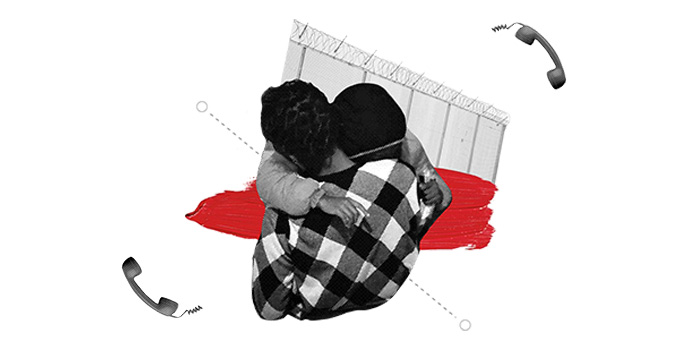Immigration Detainers
The ACLU works in courts, legislatures, and communities to defend and preserve the individual rights and liberties that the Constitution and the laws of the United States guarantee everyone in this country.

Stay informed about our latest work in Immigration Detainers.
By completing this form, I agree to receive occasional emails per the terms of the ACLU's privacy statement.
The Latest


ACLU Responds to House Passage of H.R. 29, the Laken Riley Act


ACLU Sues Immigration and Customs Enforcement for Records Regarding Potential Expansion of Immigration Detention

We’re Making Sure People in Immigration Detention Know Their Rights


Florida Sheriff Settles Lawsuit for Unlawfully Profiling and Detaining Florida Resident Born Abroad
Explore More
What's at Stake
An ICE detainer—or “immigration hold”—is one of the key tools U.S. Immigration and Customs Enforcement (ICE) uses to apprehend individuals who come in contact with local and state law enforcement agencies and put them into the federal deportation system. An ICE detainer is a written request that a local jail or other law enforcement agency detain an individual for an additional 48 hours after his or her release date in order to provide ICE agents extra time to decide whether to take the individual into federal custody for removal purposes.
ICE’s use of detainers to imprison people without due process and, in many cases, without any charges pending or probable cause of any violation has raised serious constitutional concerns. Local law enforcement agencies run the risk of litigation and damages liability when they honor ICE detainer requests.

January 2019:
Backgrounder on ICE detainer requests
August 2018:
Recent ICE Detainer Damages Cases (2018)
FAQ on ICE's New "Enforcement Partnerships" in Florida
July 2015:
Recent ICE Detainer Cases
June 2015:
ACLU and coalition partners' letter to DHS regarding implementation of Priority Enforcement Program
December 2014:
April 2014:
ACLU Administrative Recommendations on ICE Detainers
November 2013:
Restoring Trust: How Immigration Detainers in Maryland Undermine Public Safety Through Unnecessary Enforcement (ACLU of Maryland)
March 2013:
Testimony Submitted by the ACLU of Pennsylvania Regarding ICE Detainers
October 2012:
What ICE Isn't Telling You About Detainers: A Fact Sheet for Local Law Enforcement Agencies
November 2011:
Statement for Congressional Hearing on "Is Secure Communities Keeping Our Communities Secure?
An ICE detainer—or “immigration hold”—is one of the key tools U.S. Immigration and Customs Enforcement (ICE) uses to apprehend individuals who come in contact with local and state law enforcement agencies and put them into the federal deportation system. An ICE detainer is a written request that a local jail or other law enforcement agency detain an individual for an additional 48 hours after his or her release date in order to provide ICE agents extra time to decide whether to take the individual into federal custody for removal purposes.
ICE’s use of detainers to imprison people without due process and, in many cases, without any charges pending or probable cause of any violation has raised serious constitutional concerns. Local law enforcement agencies run the risk of litigation and damages liability when they honor ICE detainer requests.

January 2019:
Backgrounder on ICE detainer requests
August 2018:
Recent ICE Detainer Damages Cases (2018)
FAQ on ICE's New "Enforcement Partnerships" in Florida
July 2015:
Recent ICE Detainer Cases
June 2015:
ACLU and coalition partners' letter to DHS regarding implementation of Priority Enforcement Program
December 2014:
April 2014:
ACLU Administrative Recommendations on ICE Detainers
November 2013:
Restoring Trust: How Immigration Detainers in Maryland Undermine Public Safety Through Unnecessary Enforcement (ACLU of Maryland)
March 2013:
Testimony Submitted by the ACLU of Pennsylvania Regarding ICE Detainers
October 2012:
What ICE Isn't Telling You About Detainers: A Fact Sheet for Local Law Enforcement Agencies
November 2011:
Statement for Congressional Hearing on "Is Secure Communities Keeping Our Communities Secure?